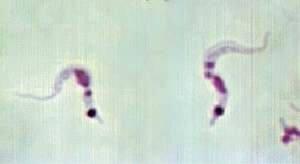In the News – Can Bed Bugs Transmit Chagas Disease?
By Chris Williams on November 25, 2014.

Trypanosoma cruzi or Chagas parasites
As annoying and traumatizing as bed bugs are, the one good thing is that they have never been shown to transmit any blood-borne diseases to people. While that is still true, new research is making health experts nervous.
We now know that bed bugs are able to both acquire and transmit the parasite that causes Chagas disease to mice, at least in a laboratory setting. Researchers from Penn Medicine’s Center for Clinical Epidemiology and Biostatistics exposed bed bugs to mice infected with the Chagas parasite, Trypanosoma cruzi, in various experiments. Of the 2,000 bed bugs tested, most acquired the parasite after feeding on the infected mice. Another experiment showed that bed bugs can also transmit the parasite to uninfected mice. Seventy-five percent of uninfected mice got the disease after living with infected bed bugs.
A third experiment found that the mice didn’t necessarily have to be bitten by the bed bugs to acquire Chagas disease. When bed bug feces was placed on a cut or scrape on a mouse’s skin, 40% of the mice became infected by the Chagas parasite through fecal contact alone. This research is important because it shows that bed bugs can be disease vectors, that they not only can pick up an infectious disease when feeding on mice, but that they can then pass the disease on to uninfected mice.
What is Chagas Disease? Am I at Risk?
Chagas disease is more common in Latin American and South America, but also occurs in the U.S. The Centers for Disease control estimates that there are approximately 300,000 cases of Chagas disease in the U.S. and the incidence has been increasing in the last few years. The disease, spread by a parasite, can progress without symptoms for years but can eventually kill its victim when it attacks the heart.
The known vector of the disease is the kissing bug (also called assassin bug or bloodsucking conenose bug), a distant relative of bed bugs. It gets its name because it sucks blood from the faces of sleeping people, but it spreads Chagas through skin contact with its feces.
The risk of getting Chagas disease anywhere in the U.S. is extremely low and is virtually nonexistent in our Massachusetts and New Hampshire region. In the U.S., Chagas disease occurs in the South, with most cases in the Southwest where kissing bugs and their pack rat hosts are found. In the U.S., kissing bugs are more often associated with livestock, chickens, pack rats, and other wild and domestic animals, and are not common in homes. Bed bugs, however, are common in homes in regions where Chagas occurs; this is what worries medical experts.
What Does All This Mean?
Local health departments across the country have been slow to address the issue of bed bugs, arguing that the blood suckers are not disease vectors and, therefore, are not of public health importance. This study is the first to show that bed bugs could be capable of actually transmitting diseases. It’s important to note, however, that this study did not examine whether bed bugs could transmit Chagas disease to humans. More study is needed to find out if that could happen, or if it already is happening. This study does reinforce the importance of eliminating bed bug infestations, and will no doubt force health officials to sit up and take notice.
- To read about the original research: American Journal of Tropical Medicine and Hygiene
- For more on Chagas disease: Centers for Disease Control
Sign up for our biweekly email newsletter for more information about bugs and pests!